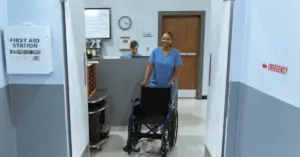In the dynamic world of healthcare, continuous learning isn’t just a recommendation—it’s a necessity.
As a travel nurse, you encounter diverse situations that require a robust skill set.
Education, formal and informal, empowers you to confidently address these challenges, providing optimal patient care.
Read on to discover the top courses and strategies every nurse should consider.
Recognize the Need for Continuous Learning
Firstly, understand why continuous education is pivotal.
Being a travel nurse exposes you to an array of patient needs, healthcare systems, and emerging technologies. By regularly upskilling, you ensure that you’re always a step ahead, ready to adapt to any environment.
Think of education as your compass in the ever-evolving landscape of healthcare.
Broaden Your Clinical Expertise
Advanced Cardiac Life Support (ACLS) and Pediatric Advanced Life Support (PALS): These certifications are often mandatory for specialties like ICU or ER but can be invaluable assets for any nurse, enhancing your emergency response skills.
Critical Care Nursing (CCRN): This certification, though specific to critical care nurses, deepens your understanding of care principles for critically ill or injured patients—a knowledge that’s handy in numerous scenarios.
Wound Care Certification: Given the prevalence of wounds, especially chronic ones, in many patients, a specialization in wound care can make you an indispensable asset to any healthcare team.
Harness the Power of Soft Skills
Communication Courses: Effective communication is crucial in healthcare. Courses that focus on patient communication, inter-team coordination, or even intercultural communication (given the diverse patient demographics) can be invaluable.
Leadership and Management: Whether you aspire for leadership roles or not, understanding how healthcare units function, team dynamics, and leadership principles can amplify your contribution to any assignment.
Stress Management and Resilience: Given the demanding nature of nursing, courses that equip you with tools to handle stress and develop resilience can have a profound impact on your well-being and performance.
Stay Updated with Emerging Trends
Telehealth Training: As healthcare increasingly moves online, understanding the nuances of telehealth, from communication tools to digital patient management, becomes crucial.
Health Informatics: Dive into how data is transforming healthcare. Understanding electronic health records, patient data analytics and digital health platforms can set you apart.
Consider Advanced Degrees
Whether it’s a Master’s in Nursing, Nurse Practitioner programs, or even non-clinical degrees like Healthcare Administration, advanced education can open doors to diverse roles, from clinical specializations to management.
FAQs
1. Are all these courses and certifications necessary for travel nurses?
Not all are mandatory, but they can significantly enhance your employability and the range of assignments you can confidently undertake. Tailor your educational pursuits to your career goals.
2. How often should I renew my certifications?
Each certification has its renewal guidelines, typically every 2-3 years. It’s crucial to stay updated on these timelines to maintain your qualifications.
3. Is online learning as valuable as in-person courses?
With advancements in digital learning platforms, many online courses offer robust training. However, ensure the course is accredited and recognized in the nursing community.
4. Can I manage continuous learning with my travel nursing assignments?
Absolutely! Many institutions offer flexible learning modules tailored for working professionals. Online courses, weekend classes, or even short-term intensive workshops can fit seamlessly into your schedule.
5. How do I decide which advanced degree to pursue?
Reflect on your career aspirations. If you wish to remain in direct patient care, degrees like Nurse Practitioner might be apt. If you’re inclined towards administrative roles, consider degrees in Healthcare Management or Administration.
In the end, remember that in healthcare, learning never ceases. Each patient, each assignment, and indeed, each course, adds a new dimension to your professional journey.
Embrace education as your ally, guiding you towards excellence, adaptability, and empowerment.





